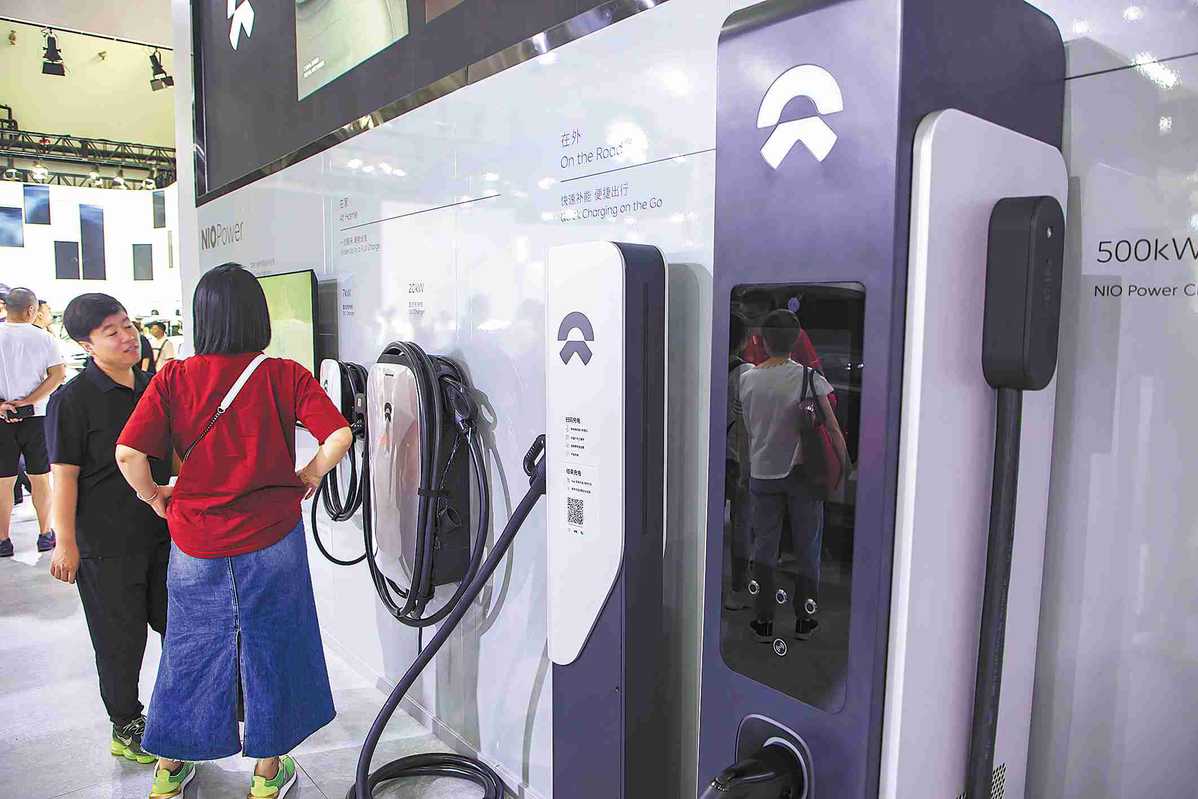
Visitors check out NIO charging piles during an international automobile expo in Changchun, Jilin province, in July. The company aims to build 1,000 battery swapping stations in China in 2023, bringing the total number to 2,300 by this year-end. [Photo provided to China Daily]
Electric vehicle startup NIO’s partnerships with the country’s oil behemoths underscore its ambition to speed up the expansion of its battery swapping network, industry experts said.
NIO plans to build 1,000 swapping stations in China this year to bring the total number of such sites to 2,300 by the end of the year.
NIO signed a strategic cooperation framework agreement with China National Offshore Oil Corp on June 27 in Anhui province to jointly build EV charging and battery swapping infrastructure in the country.
Though the two parties did not disclose the specific number of such stations that would be built, they have so far started operating three EV charging and battery swapping stations in the country.
The company began cooperating with China’s three major oil companies in 2021, when it signed an agreement with China Petrochemical Corp, better known as Sinopec, to jointly develop battery swapping stations.
Later that year, NIO put into operation two battery swapping stations it built with China National Petroleum Corp in Shaanxi province in Northwest China, marking a major milestone in its efforts to expand its energy replenishment network.
Analysts believe NIO’s ambition to build 4,000 battery swapping stations across the globe by 2025 is in line with those of the three major oil companies, which have been diversifying their businesses in recent years, including non-oil ventures such as EV charging and battery swapping services.
China, which has seen rapid growth in new energy vehicles in recent years as well as a sustained change in transportation driven by advanced technology, is a key market for both energy companies and EV manufacturers, said Luo Zuoxian, head of intelligence and research at the Sinopec Economics and Development Research Institute.
The collaboration between the two parties, with their huge retail networks and manufacturing capacity, will facilitate more advanced fast-charging solutions, bringing benefits to retail customers, he said.
Sinopec vows to set up 5,000 battery swapping stations during the 14th Five-Year Plan (2021-25) period to jointly push forward the country’s NEV development, while CNPC aims to come up with more than 1,000 EV charging and battery swapping stations by the end of 2025.
Lin Boqiang, head of the China Institute for Studies in Energy Policy at Xiamen University, said technological advances have sparked an investment spree among companies and governments globally with the intention of dominating the next generation of energy technology.
The collaboration is proof of NIO’s drive to ramp up its presence in the EV market at home and abroad, he said.
In addition to domestic energy players, NIO has also signed strategic cooperation agreements with international energy giants, including British energy company BP and Hague-based Royal Dutch Shell.
According to its agreement with Shell in 2021, the two parties will develop a network of co-branded battery swapping stations, and aim to reach 100 sites by 2025.
The two parties will also collaborate in Europe to provide customers with access to one of the largest roaming EV charging networks on the continent.
While some people say battery swapping stations are a costly investment, NIO argues that battery swapping is both a quicker solution to powering up EVs as well as an energy storage facility to improve grid stability.
Besides NIO, carmakers such as BAIC and battery maker CATL are also exploring the segment, with many of their models now capable of battery swapping.
Analysts at Founder Securities estimate that there will be 3.2 million battery-swapping cars across the country by 2025, with more than 28,000 battery swapping stations.
Dongwu Securities said that the number of new battery swapping stations will exceed 16,000 by 2025, with an additional investment of over 60 billion yuan ($8.4 billion).
There were 2,266 battery swapping stations across the country by the end of June, according to the China Electric Vehicle Charging Infrastructure Promotion Alliance.
This underscores the substantial potential for more swapping stations in the country, Lin said.
